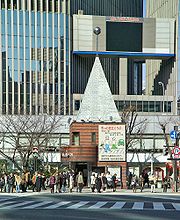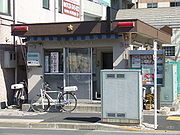
Koban (police box)
Encyclopedia
.svg.png)


Police station
A police station or station house is a building which serves to accommodate police officers and other members of staff. These buildings often contain offices and accommodation for personnel and vehicles, along with locker rooms, temporary holding cells and interview/interrogation rooms.- Facilities...
s, Japanese uniformed police work is done from small buildings located within the community, a form of community policing. , there are about 6,000 kōban all over Japan. Since the 1990s, many of them are found with signs in all-capital Roman letters: "KOBAN".
Overview
A kōban is typically a two-storied housing with a couple of rooms (although there is wide variation), with from one to more than ten police officers. The officers in these buildings can keep watch, respond to emergencies, give directions, and otherwise interact with citizens on a more intimate basis than they could from a more distant station. Although often translated to English as "police box", the kōban bears little resemblance to the British police boxPolice box
A police box is a British telephone kiosk or callbox located in a public place for the use of members of the police, or for members of the public to contact the police...
.
The name kōban derives from the name of the earliest structure built in 1874, which were indeed simple boxes meant for , thus creating a compound word consisting of and . Soon in 1881, kōban were transformed into local community stations with as much as six officers and a new official name was given to it — although its common name, "kōban" survived. "Kōban" was further systematized and spread out nationwide, playing an important role in the Japanese police system over decades. It was in 1994 when once again the official name of was changed back to kōban. One of the issues recognized in the last several years as most significant around the kōban system was the existence of (un-manned stations). According to the National Police Agency, this issue was addressed and solved by 2007.
Services provided
_from_sudo-cho.jpg)
- Maps and directions – Providing maps and directions to local addresses, sometimes even personally guiding those unfamiliar with local street layouts and addressing schemes. Additionally, officers can refer people to local hotels, restaurants, and other businesses.
- Lost and found – Accepting reports of lost items and accepting found items from members of the public and, if a matching lost item is turned in, notifying the owner of the item to come pick up the item.
- Crime reports – Taking police reports, typically for property crimeProperty crimeProperty crime is a category of crime that includes, among other crimes, burglary, larceny, theft, motor vehicle theft, arson, shoplifting, and vandalism. Property crime only involves the taking of money or property, and does not involve force or threat of force against a victim...
s such as theftTheftIn common usage, theft is the illegal taking of another person's property without that person's permission or consent. The word is also used as an informal shorthand term for some crimes against property, such as burglary, embezzlement, larceny, looting, robbery, shoplifting and fraud...
and burglaryBurglaryBurglary is a crime, the essence of which is illicit entry into a building for the purposes of committing an offense. Usually that offense will be theft, but most jurisdictions specify others which fall within the ambit of burglary...
. - Emergency services – dialing the emergency telephone numberEmergency telephone numberMany countries' public telephone networks have a single emergency telephone number, sometimes known as the universal emergency telephone number or occasionally the emergency services number, that allows a caller to contact local emergency services for assistance. The emergency telephone number may...
"110" in the case of police, fire, or medical emergency. Direct contact can be made with the kōban and assistance will be dispatched.
See also
- Police system of JapanPolice system of JapanLaw enforcement in Japan is provided by the Prefectural Police under the oversight of the National Police Agency or NPA. The NPA is headed by the National Public Safety Commission thus ensuring that Japan's police are an apolitical body and free of direct central government executive control...
- Neighbourhood Police Post, similar buildings in SingaporeSingaporeSingapore , officially the Republic of Singapore, is a Southeast Asian city-state off the southern tip of the Malay Peninsula, north of the equator. An island country made up of 63 islands, it is separated from Malaysia by the Straits of Johor to its north and from Indonesia's Riau Islands by the...
- Police boxPolice boxA police box is a British telephone kiosk or callbox located in a public place for the use of members of the police, or for members of the public to contact the police...
, telephone booths formerly widely employed in the United KingdomUnited KingdomThe United Kingdom of Great Britain and Northern IrelandIn the United Kingdom and Dependencies, other languages have been officially recognised as legitimate autochthonous languages under the European Charter for Regional or Minority Languages...
and other countries for use by the police, and by the public to contact the police
External links
- Etymology of koban, Japanese language site of TokyoTokyo, ; officially , is one of the 47 prefectures of Japan. Tokyo is the capital of Japan, the center of the Greater Tokyo Area, and the largest metropolitan area of Japan. It is the seat of the Japanese government and the Imperial Palace, and the home of the Japanese Imperial Family...
Metropolitan Police Department. Click "トップ" (at top) for English language version. - http://www.koban.fr
- Koban System of Japan and the Neighbourhood Police Centre System of Singapore

